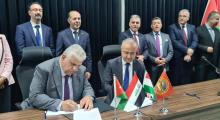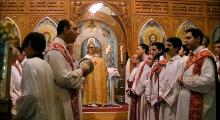Issued by the Catholic Center for Studies and Media - Jordan. Editor-in-chief Fr. Rif'at Bader - موقع أبونا abouna.org

The joint ecumenical solidarity visit signified a collective commitment to stand with the churches and people of Sudan in their time of need, offering both spiritual and moral support as they strive for peace, healing, and reconciliation.
The goal of the visit was to express solidarity and provide spiritual and pastoral accompaniment to the churches and people of Sudan following a one-year war.
The ecumenical delegation was led by WCC general secretary Rev. Prof. Dr Jerry Pillay and WCC president from Africa His Holiness Most Rev. Dr Rufus Okikiola Ositelu, of the Church of the Lord (Prayer Fellowship) Worldwide, who preached on 21 April in the Cathedral of Christ Province of Episcopal Church of Sudan.
“The solidarity visit to Port Sudan was informative, enlightening, alarming, and shocking,” said Pillay. “We engaged in conversations with church leaders, women, youth, the president, vice-president, other government officials, other religious leaders, and different groups of people.”
More than eight million people in Sudan are displaced, living in schools under very poor conditions. Religious sites have been destroyed. Women have and are still being persecuted. People are hungry.
“We heard the plea of church leaders and people to help stop the war in Sudan and the need for urgent humanitarian assistance,” said Pillay. “While the government underlined the need for humanitarian aid, it was considered that there is an over-exaggeration that 25 million people are starving when the real issues are infrastructures, and production and service delivery of food to the people.”
The ecumenical delegation emphasized that humanitarian aid must reach people who are really suffering. The delegation also identified a need to rebuild churches after the war.
“The government also attributes much of the conflicts in Sudan to the political interference and interests from other countries in the world,” said Pillay. “The WCC calls on the leaders in Sudan to resort to dialogues to resolve the current conflicts, to put the interests of the people at heart, especially considering the humanitarian challenges faced in the country and the ravages of violence.”
The WCC further called on international communities to offer humanitarian support to Sudan and work towards ending the war. “We call on our member churches and all people of goodwill to uphold Sudan in prayers and support,” said Pillay.
The delegation met with Sudan president General Abdul Fattah Al-Burhan.
“I informed him about the composition and work of the WCC, and how we have been engaged in peace missions in the past and present, including Cuba, Colombia, Palestine, and Sudan in the past,” said Ositelu. “I also expressed our concern about the situation in Sudan and shared how we are also involved in humanitarian assistance.”
The delegation also met with the vice president of Sudan, Malik Agar.
Agar praised the efforts of the World Council of Churches and its keenness on peaceful coexistence and upholding the values of tolerance and love among all peoples.
Pillay stressed the government's endeavor to lay the foundations of peace in Sudan, to promote the values of religious tolerance, and to work to establish peace and community security.







